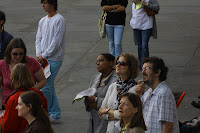A couple of weeks ago The Washington Post ran a leader that was critical of the Methodist Church in Britain’s Conference resolution to ban BNP members from becoming members of the Church.
“If the Church is going to make gospel standards a requirement for membership, the BNP soon will be larger than the Church,” the article concluded cynically.
(Here it is in full: http://tinyurl.com/mfa68k)
Today I came across a story online featured in the American publication, Christianity Today, bearing the news that United Methodists have defeated amendments which would have made Church membership open to all Christians regardless of sexual orientation.
So, should the observation be: “If the Church is going to make gospel standards a requirement for membership, homosexuality soon will be larger than the Church”?
I don’t think so.
Daniel Burke, the Christianity Today reporter, goes on:
“Delegates at the United Methodist Church's General Conference last year approved the sexual orientation amendment…The amendment followed a controversial case in 2005 in which a Virginia clergyman denied membership to a gay man who would not agree to change his sexuality. The UMC's high court later backed the pastor's decision.”
Asking someone to change their sexuality is the same as asking someone to change their sex or the colour of their skin.
Daniel quotes Mark Tooley whom he calls “a Methodist and president of the Institute on Religion & Democracy” (http://tinyurl.com/l77zp7).
“'It is only thanks to the African and other international delegates that United Methodism has upheld biblical standards about homosexuality,' Mark Tooley, a Methodist and president of the Institute on Religion & Democracy, warned in April.
"'Liberals increasingly resent the growing African influence in our church and know they cannot win when the African churches are growing and the U.S. church declines, unless they can at least partially separate the U.S. church from the African churches,' he wrote in lobbying against the amendments.”
I should point out that Mark is a United Methodist – which is a different Church to the Methodist Church – in case there was any confusion. That said, I feel for the United Methodists fighting against this mentality.
In Conversation: Rocky Dawuni
7 years ago
 It is an art project and the participants are known as the plinthers. So, is Holy Communion art and did Ken’s appearance on the Plinth answer the question? Ken told me he hadn’t:
It is an art project and the participants are known as the plinthers. So, is Holy Communion art and did Ken’s appearance on the Plinth answer the question? Ken told me he hadn’t: 


